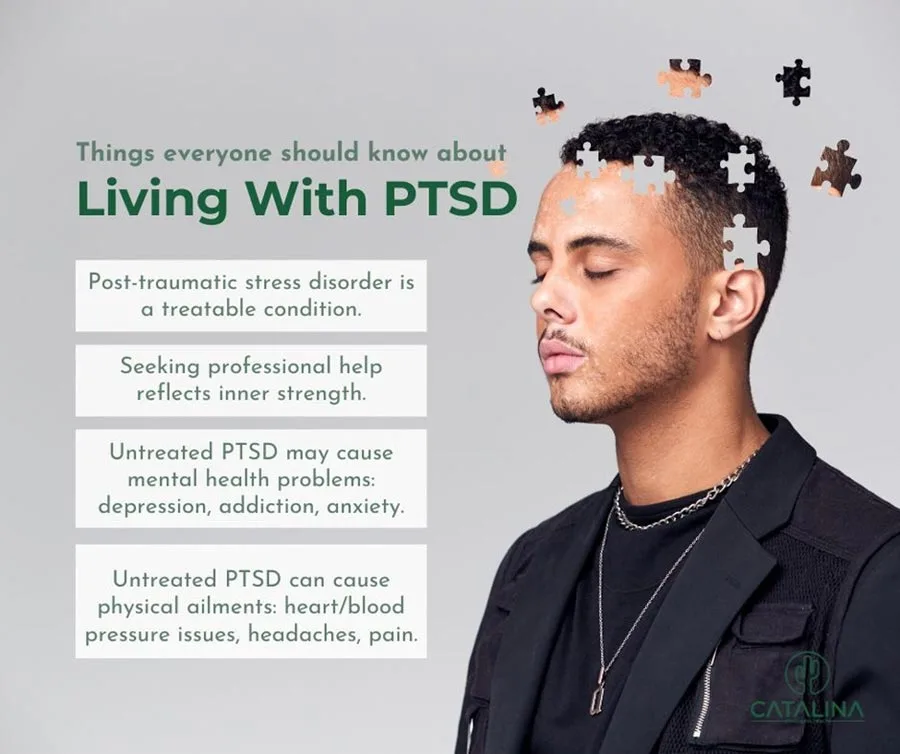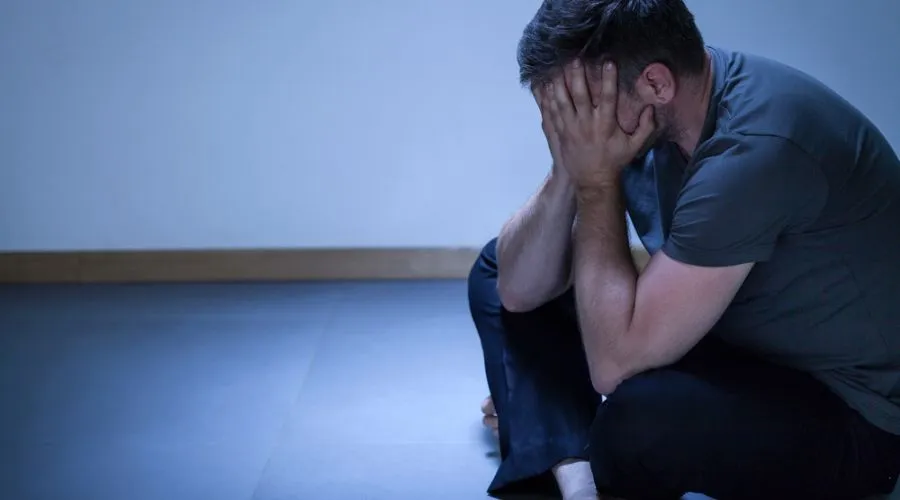Understanding the Consequences of PTSD Left Untreated
If you have arrived at our resource, it is likely you or a loved one has (or may have) post-traumatic stress disorder (PTSD). Have you heard about all the possible risks of living with untreated PTSD symptoms?
Many people who have PTSD (or other mental health conditions) are fearful about seeking treatment. Some would rather live with the memories of the traumatic events rather than get help due to the unfair stigma that still surrounds getting mental health help.
But would you avoid the hospital with a broken bone or serious illness? PTSD is equally important to treat, and you or your family member who is struggling deserve the chance to have a proven, effective treatment plan to improve their physical and mental health.
Catalina Behavioral Health knows well the mental health disorders and complications that can arise from post-traumatic stress disorder. PTSD symptoms can be incredibly disruptive and put those who struggle at a higher risk for comorbid mental health conditions. We provide the professional help you or your loved one needs to improve the quality of daily living and make each day easier.
We invite you to continue reading to learn more about post-traumatic stress disorder and also find out more about getting effective treatment for this serious mental health condition.
Confidential Trauma and PTSD Assessment
Seeking Mental Health Services Reflects Your Strength
A wonderful new mantra in the behavioral health field is, “Getting help isn’t a sign of weakness; it’s a sign of strength.”
That is very true. For too long, people have treated mental health as less important than physical health. But the two are closely connected.
Untreated PTSD leads to a host of other physical ailments (more about that in the next section).
Whatever your reason, you are doing the right thing. You recognize that people with untreated PTSD are at a higher risk for everything from chronic loneliness to grave medical conditions. Learning more about untreated PTSD and why it’s so important to get treatment shows your strength.
Untreated PTSD Can Lead to Other Mental Health Conditions

The pain and stress of living a life interrupted by PTSD disrupts normal brain function. As a result, those living with this mental health condition often live with persistent fear, hopelessness, and social isolation.
Beyond those general malaises, those with post-traumatic stress disorder have an increased risk for additional mental and physical health problems.
Here are a few PTSD effects that can decrease the person’s overall well-being:
Anxiety Disorders or Panic Disorders After Traumatic Experiences
Traumatic events can cause unexplained fears, panic, or hypervigilance. Intrusive thoughts about the trauma can be distracting or destructive to the point of developing an anxiety disorder or panic attacks.
The aftermath of PTSD can leave the person’s life in complete upheaval. In some cases of those experiencing PTSD in the workplace, it can even mean the loss of a job or career.
Chronic Pain and Stress After a Traumatic Event
The stress of a traumatic event often triggers the body’s fight-or-flight response to trauma, increasing the body’s natural balance of the hormone cortisol. That overproduction can lead to muscle tension and inflammation.
The worst part for many with PTSD is spurring this response repeatedly due to living with flashbacks to the event. This repeated stress can lead to chronic headaches, body aches, heart disease, and digestive symptoms.
Get Effective Trauma Treatment Options
Severe Depression After Previous Trauma
Untreated PTSD makes some people have overwhelming sadness or depression. They feel mired or stuck in the depression, becoming hopeless. They may find it difficult to have any joy or purpose in life.
The negative thought patterns of PTSD can even lead to self-destructive behavior or suicide attempts.
Note that if you (or a loved one) are experiencing current thoughts of self-harm, or suicidal ideation, please reach out immediately to *988 or 911 for emergency attention and support.
Autoimmune Diseases and Trauma
Recent research suggests a link between Lupus, an autoimmune disorder, and PTSD. Non-profit foundation Lupus LA explains how some researchers believe the elevated stress hormones may cause Lupus and other autoimmune disorders.
This information is relatively recent. Most medical professionals believe that more research, including large studies and clinical trials of possible treatment options, is necessary. Still, it is a point worth consideration for anyone who has experienced traumatic experiences.
Substance Abuse in Individuals with Untreated PTSD
Those who don’t seek care from a professional may attempt to manage symptoms of PTSD by abusing drugs or alcohol. That sets off a vicious cycle – the alcohol or drug may soothe the PTSD symptoms, but the relief after substance use is short-lived.
And those suffering use and use again, temporarily muting the PTSD without getting to the heart of the issue. The substance use cycle causes relationship problems. It can eventually lead to an inability to maintain employment.
This problem is especially well-documented in those who have served in the Armed Forces. The Department of Veterans Affairs notes the co-occurrence of PTSD and substance abuse in the general population is 44.6%; they claim the number is approximately doubled in veterans.
Events That Can Cause Post-Traumatic Stress Disorder (PTSD)

Why does someone develop PTSD?
If you are reading this but have never experienced extreme trauma, you might wonder what events could trigger such a response in your family members or loved ones.
Here are some frequent triggering events of PTSD that the Catalina Behavioral Health team has successfully treated in the past:
- A physical attack
- Sexual assault
- Natural disasters
- Life-threatening medical conditions
- Vehicle accidents
- War or migration
- A series of complex trauma triggers (complex PTSD)
As you look at the causes, keep an open mind and remember that not everyone experiences trauma the same. Some individuals can survive a trauma and have the coping skills and other factors that help them process it and distance themselves without help. However, others need to seek professional help to move past it to reclaim their well-being.
A Sampling of the Most Common PTSD Symptoms
Recognizing the symptoms of PTSD can be a first step toward seeking help. These signs are just as varied as the causes. Not everyone will have all these signs. The intensity of the symptoms is also varying; some will experience them more deeply than others.
Here is a partial list that includes the most common PTSD symptoms:
- Difficulty concentrating or lack of focus
- Sleep disturbances
- Social isolation
- Nightmares
- Flashbacks
- A feeling of impending doom
- Hypervigilance
- Suicidal thoughts
There are many other symptoms, although they are less frequent.
Our Methods of Treating PTSD at Catalina Behavioral Health

Left untreated, the symptoms of PTSD can become overwhelming and cause a decline in one’s well-being. But untreated PTSD does not need to be that way.
PTSD is a treatable condition. Working with a mental health professional means improving quality of life. PTSD treatment can be an early intervention that can also head off other mental or physical health problems.
Here are some methods our professionals rely on to treat PTSD:
- Eye movement desensitization
- Cognitive processing therapy
- Exposure therapy
- Cognitive behavioral therapy
Clients work in individual therapy, taking deeper dives into their PTSD with a licensed counselor guiding them. They also frequently boost social support through group therapy and family counseling, building a supportive and healing community.
We customize our PTSD treatment programs to address each person’s need through evidence-based therapies. Our holistic approach to trauma-informed treatment ensures that we can minimize the impact of a traumatic event and help you move forward.
Up To 100% of Rehab Costs Covered By Insurance
Connect With Catalina for Proven PTSD Help Today
Are you ready to get treatment for PTSD? The entire Catalina Behavioral Health team is here to support you. Our singular goal is to help minimize the impact of PTSD on your life and help you rediscover your joy.
We accept most insurances and provide every client with the highest level of PTSD care in the Tucson, Arizona, area. Give us a call today; we can help you or your loved one as soon as tomorrow.





